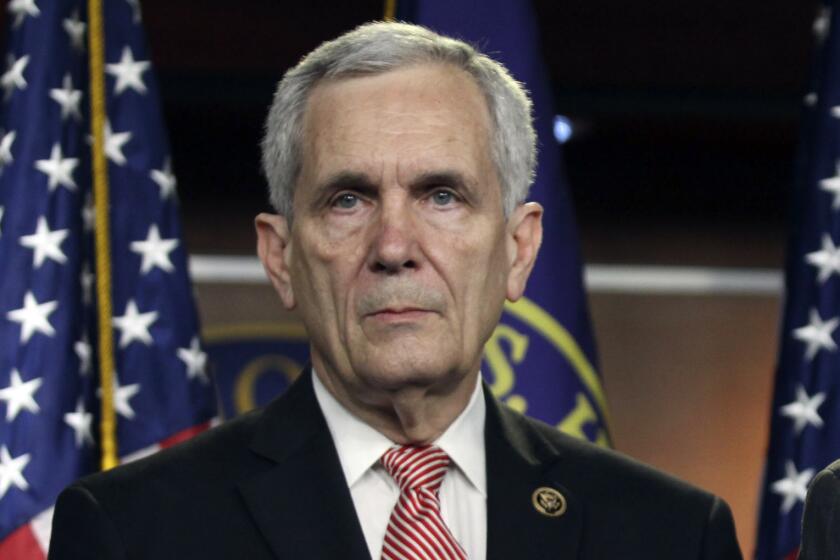State Penal System Is Hammered in Report
California’s $5.3-billion penal system is plagued by a pervasive “code of silence” that protects rogue guards, corrupts recruits and is condoned by leaders who “neither understand nor care about the need for fair investigations,” a federal report charged Thursday.
At the very top of California’s vast Department of Corrections, officials face unrelenting pressure from the powerful prison guards union and are unwilling to discipline officers who attack inmates or engage in other misconduct, says Special Master John Hagar, a prison expert appointed by a federal judge.
Hagar’s report, still subject to review, amounts to a sweeping indictment of the department’s ability to police itself, and recommends criminal charges against former Corrections Director Edward S. Alameida and a high-ranking deputy.
Collectively, the department’s failure “is more than mere negligence,” Hagar said. “It is nothing less than the awareness of a serious security-related problem and the subsequent deliberate disregard of that problem.”
He concluded that Alameida was moved by union meddling to improperly close a perjury investigation of two guards at Pelican Bay State Prison, then conspired with others to conceal his actions. Alameida should be charged with contempt, and Thomas Moore, former chief of investigations, should be charged with perjury for lying in federal court, Hagar said.
Prison officials acknowledged some shortcomings and vowed that reforms underway would erect a “firewall” preventing inappropriate influence.
Alameida, who resigned as director in December but remains on the department payroll and will assume an unspecified post after an extended vacation, emphatically denied wrongdoing.
“I am particularly disturbed by allegations that I interfered with an investigation or investigations,” he said in a statement. He added that he recently launched an overhaul of the prison system’s internal disciplinary process and expressed hope that improvements would restore “public and employee faith” in the department.
Hagar’s draft report will be reviewed by state officials and others, who may raise objections before a final document is filed with the federal court. At that point, a judge may refer the matter to U.S. prosecutors or order reforms.
The report comes on the eve of state Senate hearings into any mismanagement and cover-ups in the penal system, the nation’s largest with 161,000 inmates and 32 prisons. The senators convening the hearings called the findings proof of a department one described as rotten.
“It’s reprehensible, and I think the report shakes the very foundation of that institution,” said state Sen. Jackie Speier (D-Hillsborough). “The power of the [union] in dictating to the director of corrections what he will and will not do is chilling.”
Sen. Gloria Romero (D-Los Angeles), chairwoman of the Senate’s special prison oversight committee, said the department had “lost control of its investigative and discipline processes. It seems to me they are just one step away from receivership, from being taken over and run by a federal court.”
The guards union, the California Correctional Peace Officers Assn., is one of the most powerful players in state politics. It gave $1.4 million in direct and indirect contributions to former Gov. Gray Davis in his first term.
A union vice president, Lance Corcoran, said he agreed with one conclusion in Hagar’s report: The department’s record on internal inquiries is shameful.
“But our read on that would be 180 degrees opposite of Mr. Hagar’s,” Corcoran said. “The problem is these investigators are ill-trained, and they are over-charging, and there is a profound lack of perspective as to what’s important” in terms of officer misconduct.
As for alleged union influence over internal probes, Corcoran said the organization “absolutely” does what it can to protect officers from “bad investigations, of which there are many.”
Hagar’s 78-page report is an outgrowth of a court decision placing Pelican Bay under the supervision of a federal judge in San Francisco. In 1995, U.S. District Judge Thelton Henderson found that poor medical care and brutality by guards at the Crescent City maximum security prison violated the civil rights of inmates.
As part of that ruling, Hagar monitors the prison’s progress to ensure compliance with court orders specifying reforms. Last year, he held hearings on allegations that Alameida shelved the perjury investigation of two guards shortly after receiving a phone call about the case from a union official. The guards were suspected of lying in court to protect abusive co-workers.
In November, Alameida testified and firmly denied allegations of union pressure. Rather, he said, a meeting with investigators and department attorneys had convinced him that the case was weak.
Later, when more information became available, Alameida reopened the inquiry. But by then the statute of limitations had expired and sanctions against the officers weren’t possible.
Hagar said that Alameida’s testimony was “not believable.” He concluded that after closing the perjury investigation, Alameida misled him about its demise by directing that he be sent a letter “emphasizing only the negatives in the case.”
A few weeks after testifying in Hagar’s inquiry, Alameida resigned, citing personal reasons.
Hagar’s report included other episodes of what he described as improper union influence, including a department decision to pay for the legal defense of an officer who shot and wounded an inmate at Pelican Bay.
The officer, David Lewis, was cleared of wrongdoing by the prison in the shooting of Harry Long but convicted in federal court. The conviction was overturned on appeal, but Lewis will be retried this year, his attorney fees paid for by the state.
Hagar said top department officials decided to pay the legal costs at the request of union officials, including its president, Mike Jimenez. Their agreement to fund the defense, Hagar noted, contradicted the advice of the department’s own legal counsel, who wrote a four-page opinion recommending against it. It also ignored what Hagar called “compelling evidence that Lewis intentionally shot Long.”
Alameida testified that the undersecretary of the state Youth and Adult Correctional Agency, Peter Jensen, had made the decision. Hagar, however, said e-mails from the department’s legal affairs director indicated that it was Alameida’s call.
Despite his findings, Hagar said that “recognition of the seriousness of this problem” has begun to increase, citing the upcoming Senate hearings. He said he has had three positive meetings with the new secretary of the Youth and Adult Correctional Agency, Rod Hickman.
More to Read
Start your day right
Sign up for Essential California for news, features and recommendations from the L.A. Times and beyond in your inbox six days a week.
You may occasionally receive promotional content from the Los Angeles Times.






